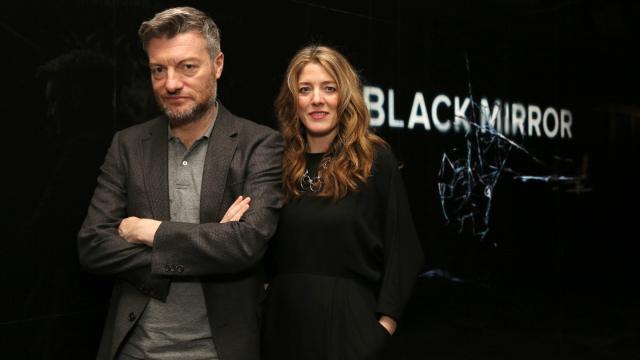Image: Invision / Blair Raughley
At this year’s Emmy Awards, Black Mirror won Outstanding TV Movie and Outstanding Writing for “San Junipero,” an outing that everyone described as unusually uplifting for a show which often takes a quite bleak look at the world. When we talked to executive producer Annabel Jones and creator-executive producer-writer Charlie Brooker, they indicated that season four would be the home to more “San Juniperos.”
We talked to Brooker and Jones on the one drizzly morning of New York Comic Con, the day they were set to bring the show into Javits Center for a panel. Brooker is exactly like you might imagine he is, if you’ve seen him in one of his numerous UK TV experiences — spinning off into flights of fancy, cursing, going high-pitched when he’s not sure of something. It’s relaxing, since it feels very much like you’re speaking to him and not some weird, promotional-bot version. Which would be very Black Mirror.
First of all, congratulations on your Emmy!
Charlie Brooker: Thank you!
Annabel Jones: Aww, thank you…
Second, I wanted to ask why it is that with everything the way it is in the world, why is dystopian fiction so popular? Because you always used to hear, “genre fiction is an escapist fantasy for people who don’t know what the real world is like.”
Brooker: Well, I guess now dystopian fiction is a blessed relief, an escape from the mega-dystopian present and reality. I don’t know.
We get asked a lot, “What’s it like writing Black Mirror during a real life Black Mirror episode that’s unfurling in 3D all around you?” And I don’t really know. This is what I sort of feel about satire, because I’ve worked in more overt comic and Daily Show-esque satire in the UK, and I remember when I was growing up in the early ’80s watching comedy shows with jokes about Ronald Reagan and nuclear war and stuff like that, and it was a comfort to me. Because I’d think, “Thank fuck for that, there are other sane people in the world pointing out what bullshit this world is.”
And I think that there’s a similar comfort in that usually dystopian stories are written by disappointed optimists. Like, the real world isn’t matching up. And I think it — in some way — tickles the same bit of the brain that good satire does now. I think it must be something weirdly comforting to have other worried people around.
Having said that, this season pre-dates a lot of what was going on because it was, like, July last year I started writing things. I didn’t know how much appetite I would have for nothing but unrelenting bleakness come late 2017. So we probably varied the tone more this season. We’ve got more playful stories, but we’ve also got really fucking horrible ones as well.
Jones: We should cover that — because what we consider playful is often still very harrowing for people.
Brooker: Because I consider “National Anthem” quite playful and a lot of people do not consider that playful.
Jones: But outside of the political climate, I think our show is not overtly political — it’s often very small, personal stories about how people live their lives. And I think there’s something reassuring about our show that it sometimes taps into concerns people haven’t articulated yet. And so there’s something reassuring about knowing someone else is worried about this.
While I’m seduced by technology, I love it and I embrace it, there’s still a cautiousness [where] I haven’t quite understood what my apprehension is. So I think people find that quite liberating. Like the “Nosedive” episode we did last year, I think a lot of people found that very unsettling, whilst enjoying it. And so that’s quite uncomfortable for people. They enjoy the humour and Bryce [Dallas Howard]’s performance, but at the same time you see it reflecting your obsession. I think people are often confounded when they watch the show.
Brooker: Hopefully. That’s our job.
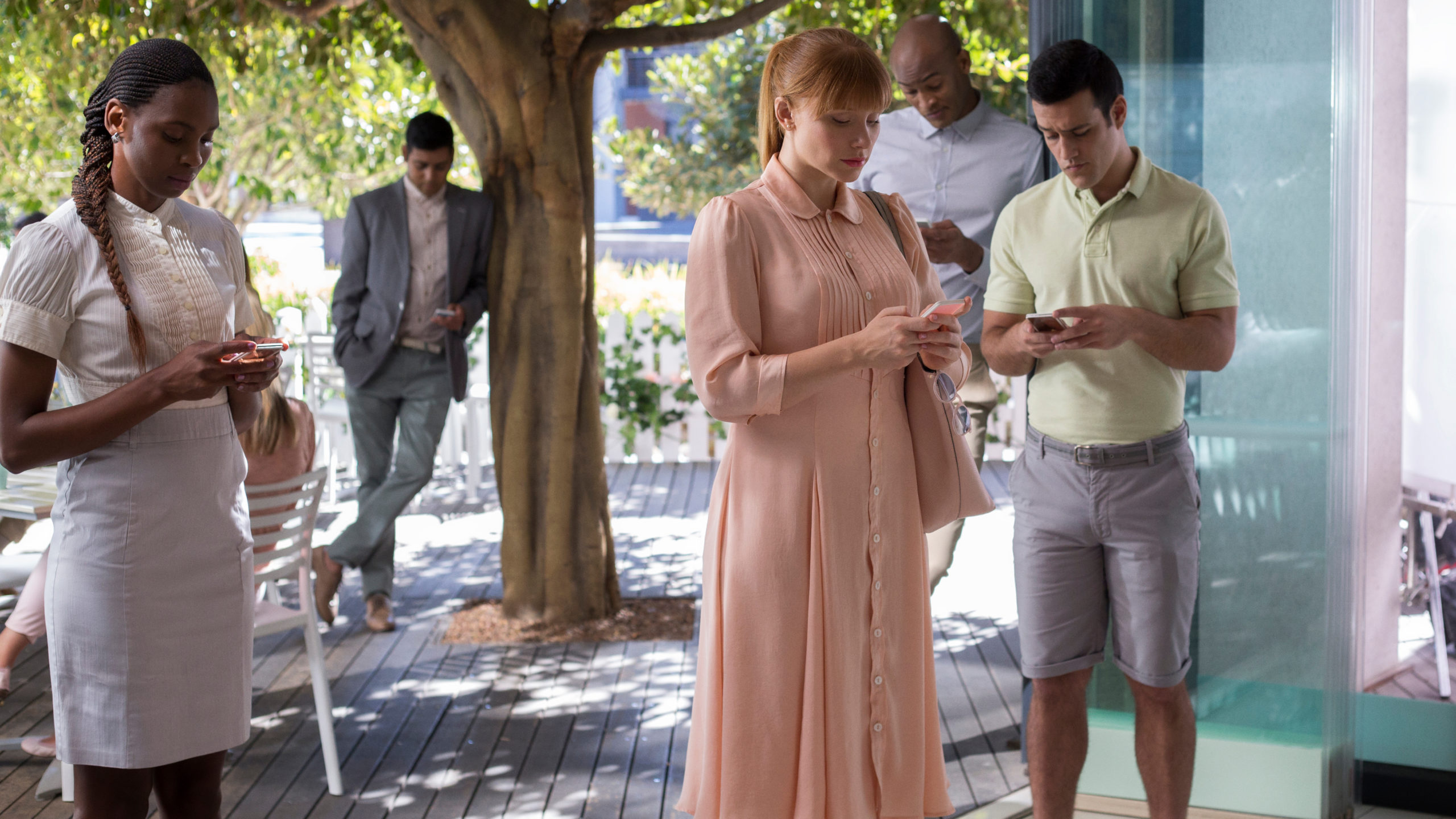
Image: Still from “Nosedive,” David Dettmann/Netflix
I also wanted to talk about the anthology format, which is coming back in a big way.
Brooker: Does seem to be, yeah. I don’t know. When we were first conceiving the show, there just wasn’t anything [like it] and that was partly why we started doing it. Because I missed that. I was a big fan of weird and wonderful things that would explore an idea that would just burn itself out over the course of an hour. Or a half-hour, like a Twilight Zone episode. Tales of the Unexpected. Or the BBC used to do these weird, wonderful one-off plays.
I think that it’s partly that it’s a format in which you can explore an idea that wouldn’t sustain a whole five-season arc. And we’re a low commitment show. In many ways you can come along and you get a full meal and you’re not left having to invest another 18 days of your life.
Jones: I think it’s definitely that. I don’t want a 10-season commitment. And also maybe, when there’s so many good dramas out there, you need to sort of break through a little bit and see something that’s a big, bold idea to sort of hook people in. And big, bold ideas you cannot sustain over many series.
Brooker: Or it’s difficult to, because you need to start filling out all aspects of the mythology that just become boring. There’s so much ad revenue involved. It’s such a place-building exercise.
And even if you’re lucky enough to be successful, you contradict yourself and your fans start screaming because they have written everything down.
Brooker: It’s weird, because I do like a binge-watch. There’s something very comforting about when you’re like five episodes into a 13-episode season of something that you’re just chewing through one episode after another.
But streaming platforms are the ideal home for anthology shows. Because it’s difficult to get the audience to come back week on week because you don’t have cliffhangers, you don’t have returning characters. And you have to explain what the story is each time, while promoting it. Whereas on Netflix, it’s like being given a pass to a movie festival. You can choose which screening you’re going to and in what order. Or think of it as a short story collection. So, technology has now allowed anthologies to really flourish.
Jones: When we first pitched the show, everyone admired the show — which was very flattering — but no one would commit to it because it was an anthology. And then you have Netflix and suddenly everyone believes in it.
Brooker: When the original UK ones went up on US Netflix and people watched it and started talking about it, that that changed like that.
It’s interesting that the change in technology helped your show about being more wary of technology.
Brooker: Kind of! We’re nothing if not massive hypocrites. But I always take issue when people say the show is anti-technology. I don’t think it is. It’s wary. Yes. Because I’m wary of everything. And it’s usually a human weakness that causes the problem in most of our stories.
A lot of stuff that used to be derided as “for nerds” — genre fiction, video games, et cetera — is now regarded as high art and drama. Why do you think we’re in an era where the top-rated shows are genre shows?
Brooker: It might be that it’s one of those cyclical things that that’s where we are as a society at the moment. That’s what we want.
Game of Thrones is interesting, because when I first watched, as soon as dragons showed up in it, I was like, “I’m out,” because I’m not a chainmail and orcs guy. I was quite cross that I was being brought into this show and there actually were dragons in it. I felt a little cheated. But then I got over that and now I’m just voraciously consuming it with everyone else. I don’t know why that is.
Production values?
Brooker: I think it’s partly that, actually. It’s interesting as well because The Twilight Zone comes up in conversation quite often. And Star Trek and shows like that — those are the shows that you can still sit down and watch. From like 50, 60 years ago. You can still watch the Twilight Zone today and get loads from it and it will be perfectly entertaining and people will know what you’re talking about if you mention The Twilight Zone [despite the production values]. There’s not many other shows from that era. So I guess it’s…
Jones: In the vernacular.
Brooker: There’s a kind of timeless quality to these things. Or maybe we just went through a period where we felt like everything was about a very troubled man. And Mad Men, Breaking Bad, and Sopranos. So, I guess what’s next? We should predict what’s next. I really don’t know… soaps?
Jones: Musicals.
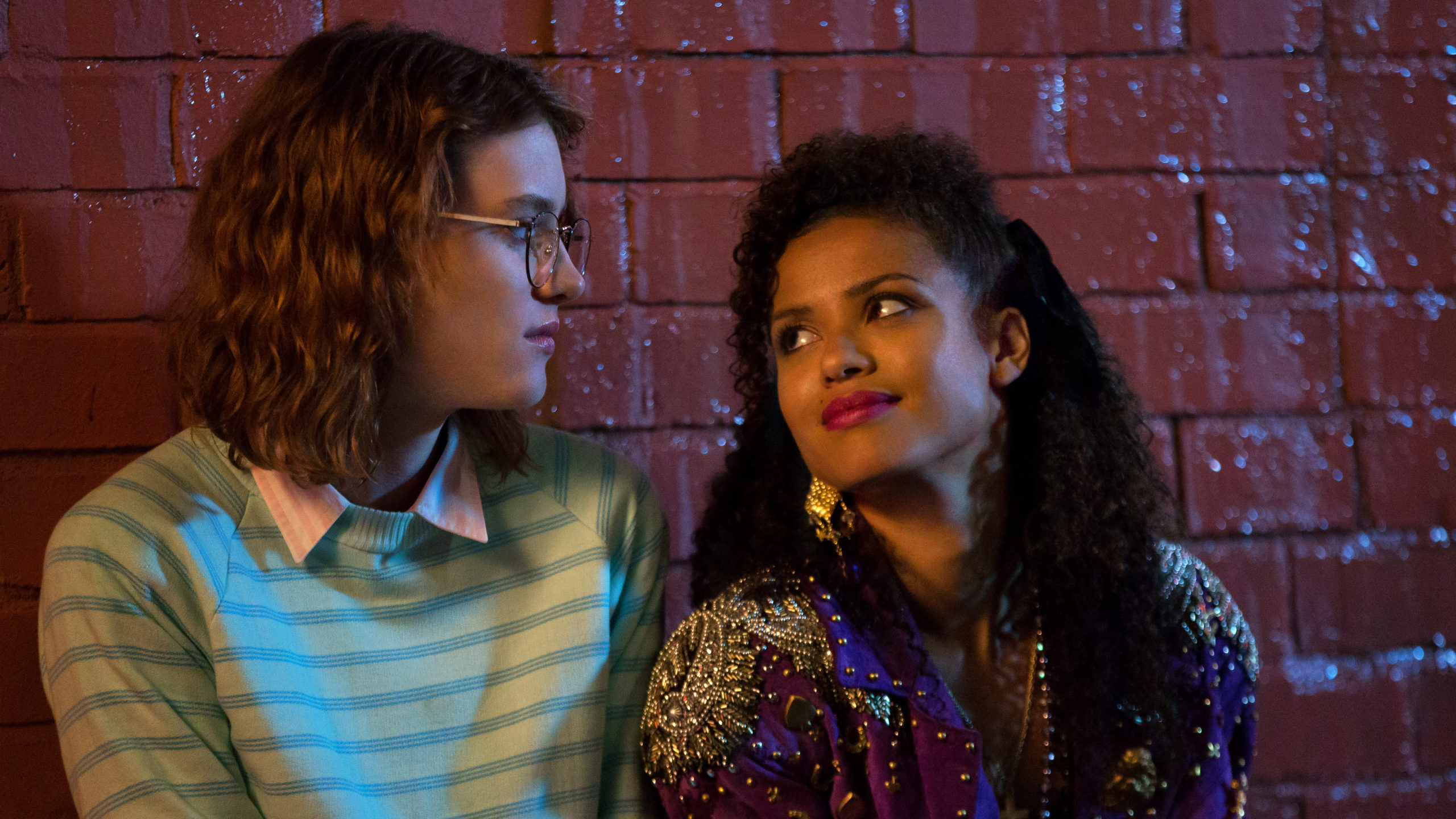
Image: Still from “San Junipero,” David Dettmann/Netflix
After having success with “San Junipero,” you said you were varying the upcoming season?
Brooker: When we started working on this season it was before the last season has premiered. So, we had no idea. For all I knew people would think “San Junipero” was the worst thing they’d ever seen. But it was definitely a conscious attempt to expand what the show was. We didn’t just want to do bleak and nihilistic horrible, terrible shoes dropping. All the time. In that respect, we’ve got a wider variety of tone this time around, I would say. We’ve braced lots of extremes in this season.
Jones: Just because it becomes predictable and boring if every episode is nihilistic and bleak.
Brooker: It’s a bit bananas. It’s probably more, in some ways, escapist this season then it has been before. One other change as well was that I was more aware of new elements in the toolbox, in the production terms. I was thinking, “OK, we can flex a little muscle there and do an episode set in outer space.” For instance. We can do that. Because that wouldn’t have occurred to me before without wanting it to look like wobbly sets and hairdryers painted silver. So, there’s more spectacle in this season while hopefully still keeping things grounded and relatable.
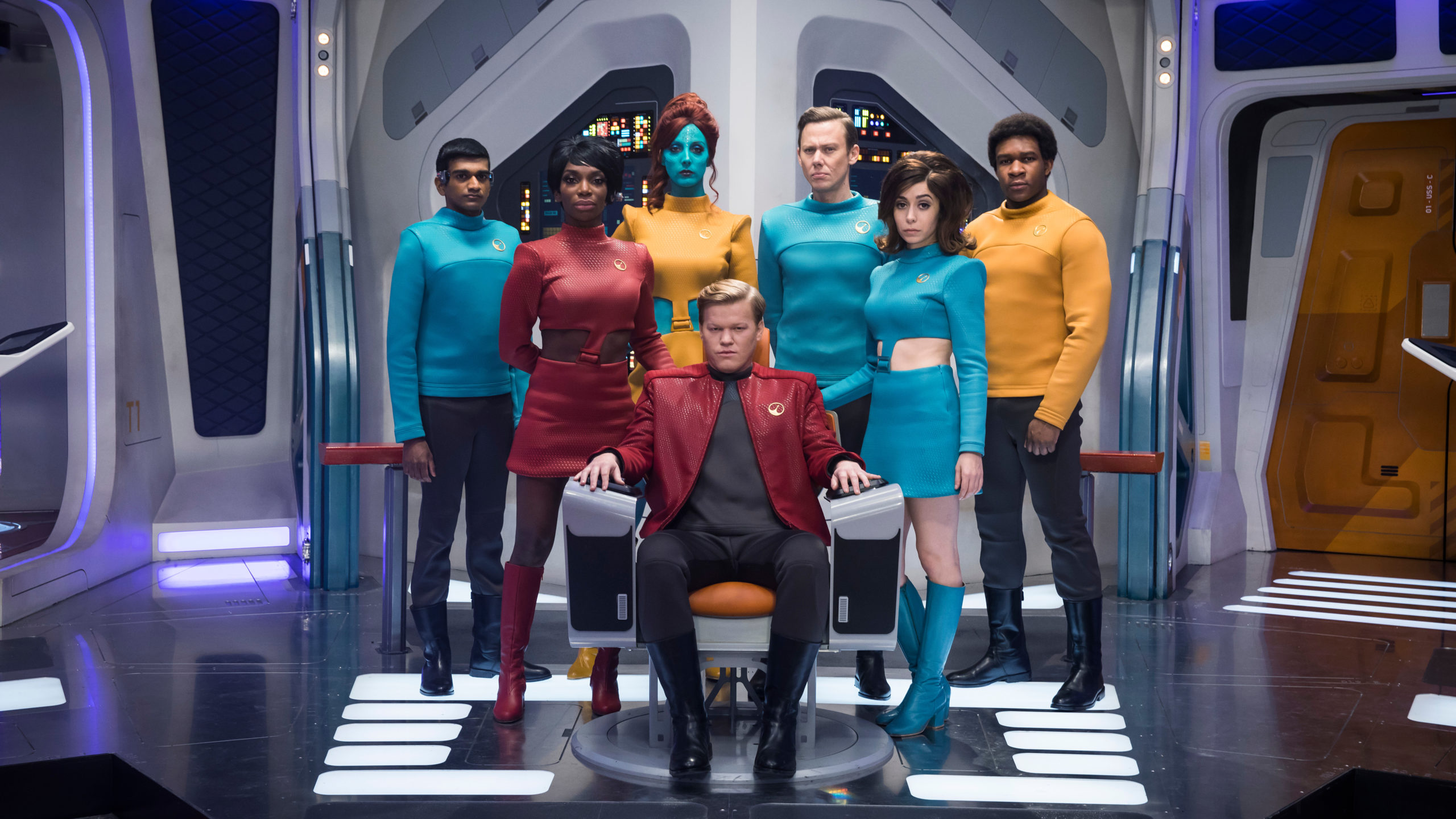
Image: “USS Callister,” Jonathan Prime / Netflix
Are there genres you’re just trying out?
Brooker: Yeah, we’ve done a space epic. In a Black Mirror-y way. Which is “USS Callister.” We’ve got Jodie Foster’s episode, “Arkangel,” the polar opposite. It’s more indie drama. It’s like a blue collar version of the near future and it’s a mother-daughter relationship. Coming of age story. We’ve got “Crocodile,” which is a noir thriller in Iceland. And again, that’s a wildly different tone. “Hang the DJ” is probably as close as we get to a rom-com in some ways.
Jones: It’s about modern dating.
Brooker: It’s quite playful. And then there is “Metalhead,” which, if the season is an album, that’s a vicious punk single. And “Black Museum” is a “Treehouse of Horror”-type episode. We did “White Christmas” once, which had three stories in one, and “Black Museum” also has several stories in one. That’s more Tales from the Crypt, do you know what I mean? Stephen King-ish thing.
An anthology in an anthology.
Brooker: It’s a real Russian doll. Many layers. And we refer to other stories within it, from, what I now think of as the Black Mirror universe. We deliberately refer to other stories within that episode and we flesh out some things that we’ve used in other episodes, stuff like that.
Jones: Epic, in terms of storytelling. So much in it.
Brooker: Quite a lot going on in there, isn’t there? Which is an interesting point, because then you’ve got that which is like detailed and intricate and there’s lots of things going on, and then you got a couple of other episodes which are much more pared back and simple and all about the experience. And it’s almost like a tone poem, I guess you’d say. And then you’ve got something like that which is much more of a little tapestry. Yeah. So, hopefully people will like it. That’s the ultimate aim, isn’t it? I hope people like it… as opposed to… dislike it.
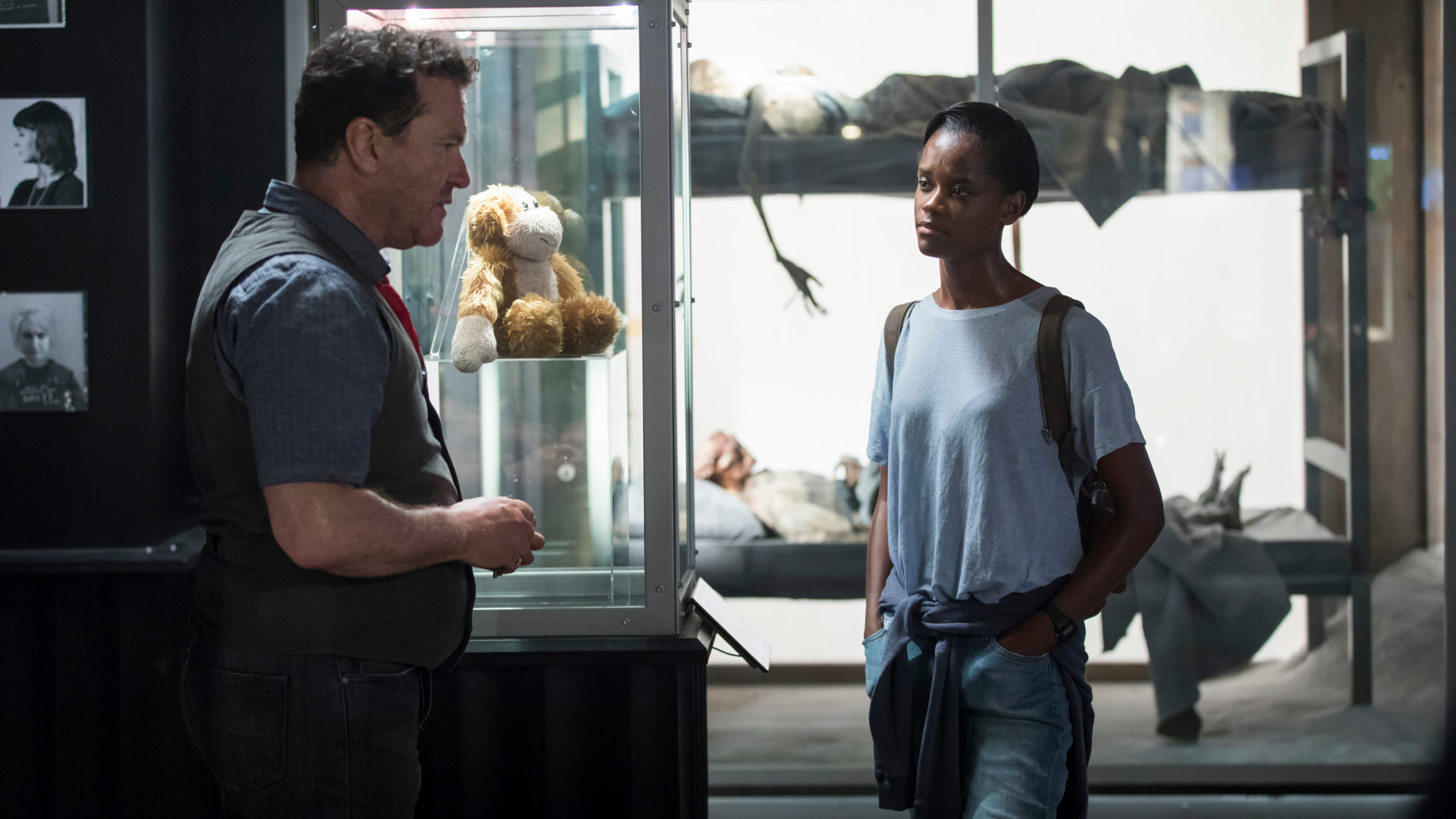
Image: “Black Museum,” Jonathan Prime / Netflix
Since you write it so far in advance, has there even been a technology where you, like, “Oh, I wish I could have hit that…” Or, “by the time I get a chance to write it we’re going to be so far away from it…”
Brooker: Sometimes there’s been things where, in between writing and the premiere, somebody launches a product and you go, “Hang on, that’s quite close to what we’re… oh my God.”
So quite often it seems that things I think are extremely far-fetched become sort of true. A good example being the bees in “Hazing the Nation” last year, which was sort of drone-bees… suddenly, that was a real thing? Like, what the fuck? We should really be in product design.
And I really think in this season there’s one thing I can’t really say without spoiling it, about facial recognition and memory, and I thought, “This is so completely far-fetched people are going to think it might as well be magic.” And then I read a story in Wired about a thing that they were doing to mice, where it was like, “They can do that? Fuck. That’s going to be real? Oh no.”
Jones: “Nosedive” had that idea years ago, and then Uber came out and we’re like, “Oh my God.”
Brooker: Oh yeah, we wanted to do that story for quite a long time. “Be Right Back” had those grief bots, as they’d say. That’s not a very sensitive term for them, but you know what I mean. We should be patenting half of this stuff. Basically. So I daresay it probably functions a bit as a showroom for other products you’ll be able to buy in 2021. Assuming we’re all still here… which I think we will be. Touch wood.
This interview has been lightly edited for length and clarity.
